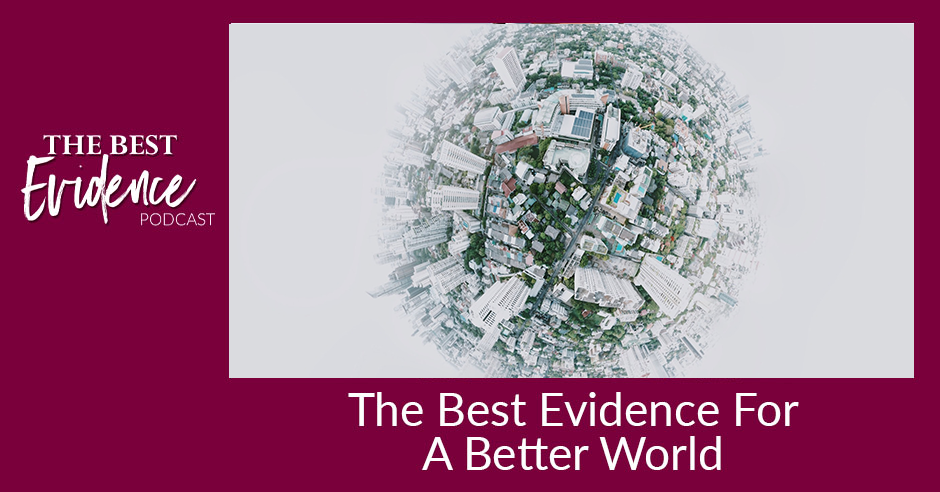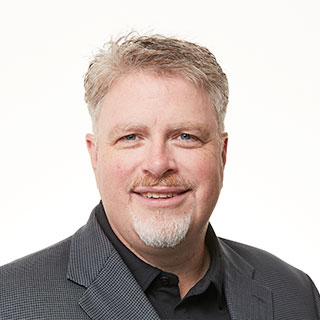
As human beings, we are all capable of creating a better world through social actions in different organizations and facilities. Someone who is very familiar in doing this is Dr. Jim Dunn and he joins Cynthia Belaskie and Robbie Brydon to talk all about making a better world through income security and housing. Dr. Jim holds the Research Chair in Urban Health Equity and is the Director of the McMaster Institute for Health Equity. He shares that he’s always been interested in health inequalities and with the discovery of the difference in health status across socioeconomic groups, he started working with organizations to help stop this issue. Dr. Jim also explains that while evidence can inform what’s needed, it doesn’t tell governments and decision makers what to do and that’s where the initiative to make a difference and steps in.
Listen to the Podcast Here
The Best Evidence For A Better World
Cynthia, can you tell me why we’re starting with episode 0?
We thought it would be a good idea to introduce readers to who we are and the projects that inspire the show. Give them a little bit of an idea about what this show is going to do.
It’s not a full episode where we go in-depth on a topic with an expert in the field.
It’s just a taste. It’s the appetizer to the full episode.
Will we still get a special guest in here anyway?
We will have someone joining us. I don’t know that I’d say he’s a special guest. He’s more of the owner of this buffet restaurant if we’re going to keep up with that food metaphor. We will get to him. Why don’t you start by talking to us about yourself and your project?
I can do that. My name is Robbie Brydon. I am heading up the Income Security and Health Initiative at the McMaster Institute for Health Equity. We exist to both produce evidence on the relationship between income security and health. Distill what’s already out there and make it easily accessible to policymakers so that we can hopefully facilitate the evidence to action cycle or evidence to inform policy decisions. Prior to this initiative being launched, I helped coordinate the evaluation with the Ontario Basic Income Pilot. Before that, I worked in a couple of places. I worked at Homeward Trust Edmonton, which is the organization in charge of the plan to end homelessness there. I have a housing connection as well. I’ve worked in Ghana, Uganda and Nigeria in different roles. With the C.D. Howe Institute in Toronto, one of the major economic think tanks in the country. It’s a handful of things all along the way. How about you, Cynthia?
I would describe myself more as somebody who spent her career talking to people about their research and trying to think about it in interesting and exciting ways. I’m the Managing Director at The Canadian Housing Evidence Collaborative. We’re this neat organization. We’re the central hub of capacity building as well as knowledge mobilization for the Canadian Housing Research Network. We helped move academic research about housing into action. We’re trying to get it out into the world where it can make a difference, where it can have the biggest impact possible. We also realize that in order to make that evidence and have ongoing creation of new academic evidence to influence policy, we’ve got to support housing researchers. A big part is bringing up the next generation of housing experts in Canada.
We can’t read the elements of a successful intervention from the coefficients in a regressional model. Share on XIn your spare time, do you figure skate?
In my spare time, I am the World Masters Builder Level Figure Skating Champion in two categories. I do like the sparkle.
You said something about the owner of this buffet.
The chef behind this intellectual smorgasbord is Dr. Jim Dunn of McMaster University.
Let’s bring him on.
—
Jim, tell us a little bit about who you are and how this show came to be.
Thanks, Robbie and Cynthia. My name is Jim Dunn. I’m a Department Chair and Professor at McMaster University in the Department of Health, Aging & Society. I hold the Research Chair in Urban Health Equity. I also direct the McMaster Institute for Health Equity. I also lead something called CHEC, The Canadian Housing Evidence Collaborative. In addition to that, I have an appointment at St. Michael’s Hospital in the MAP Centre for Urban Health Solutions. The reason why we’re all together and why we’ve launched this show has to do with using evidence to create a better world. We’re going to start off in two specific areas that I have an interest in and that we collaborate in with lots of other people.
One is in income security and the other is in housing. The housing emphasis is driven by our role as the hub of a collaborative housing research network that’s funded by the Canada Mortgage and Housing Corporation. That’s what CHEC is doing. That’s one of the functions that we’re going to serve in this show. The other reason is to support some of the activities of the McMaster Institute for Health Equity. In particular, we’re going to start off with a lot of material on income security and health. The roots of this are very deep and reflect my interests but also the interest of others. What I want to do is be able to get more voices out there, have a bigger conversation about these kinds of issues, how we get from what we find in these studies to changing the lives of people that we’re studying and people like them. Why don’t I start talking about how I see this idea of evidence? It gets talked about more and more in the public discourse but perhaps in ways that are different than the way we’re going to approach it. Does that make sense?

Yeah. It’s a big part of what both Cynthia and I are doing in trying to make that bridge between evidence and policy. Cynthia, I think that’s virtually in your job title, isn’t it?
Absolutely. Academic evidence is of no use if it sits on the shelf. We get it off the shelf and into people’s hands where it can change the decisions they make, the policies they have influence over or the conversations that they have. It starts to have an impact.
I think one way of thinking about it is even in the current context, we’re hopefully in the late stages of the global pandemic in Canada. A lot of the political claims we’re listening to the science. The thing is that listening to science isn’t a straightforward activity. It’s not a matter of study. It is published. It has this breakthrough discovery and gives a clear set of directions on exactly what to do. There’s a long process from what a study finds to implement because it’s more than just implementing to having it realized in the every day lives of people.
Maybe I can use a couple of examples to illustrate that. I’m going to start with my interests. How I got into all of this is an interest in health inequalities. The field of health inequalities has been showing that there are differences in health status that are quite large across socioeconomic groups that have initially started across income groups and educational groups but also includes differences across racialized groups. These inequalities are unjust and avoidable. There are health inequities. We’ve got thousands and thousands of studies that show there is a problem here. There’s a relationship between income and health for instance. There’s a relationship between poverty and health. There’s a relationship between being racialized minority and health.
The challenge is that it doesn’t tell us what to do. Oftentimes, academic research stops there. That pushes it out into the world and doesn’t do the work that’s required. There are lots of good reasons for that to get it into something that is usable. It’s not a straightforward process either. There are trade-offs. There are different options. There are costs. The thing is that we can’t read the elements of a successful intervention from the coefficients in a regression model. If a regression model says people with lower education are four times more likely to have poor mental health, the result doesn’t give people more education. That’s not necessarily something that’s going to work. We can’t reverse it. It’s not adjusting a nutritional deficiency. We’re talking about complex systems.
With the limitations of these kinds of studies that show, “There’s a problem here,” I started getting into intervention research. The things I’m interested in have to do with income security and housing. I don’t control the income security policy. It’s very hard for me to find ways to do research on interventions in income security and health but it’s important. I don’t control who builds affordable housing given to people who experienced poverty. It’s very hard for me to study those things but I have found ways to do so. I’ve moved more and more towards trying to understand the impact of interventions in these areas but that is even not enough because the interventions typically are you need to be able to figure out how to scale them. You need to be able to figure out how to pay for them and those sorts of things.
One good example comes from Canada. It’s something called the At Home/Chez Soi Study. It was commissioned by the Mental Health Commission of Canada. It was a randomized trial in five cities of supported housing for people with mental illness and addictions. What it showed is that providing supported housing to people with mental health and addictions works in keeping people housed for a long period of time. It doesn’t have a huge impact on their symptoms. It doesn’t have a huge impact on their use of healthcare but it does have a pretty big impact on their use of other services like emergency response services, policing and criminal justice.
Ultimately, what they showed is that the cost of the program for high-needs clients was less than the cost of the service utilization that was avoided by the program. Some people would say that it pays for itself. It’s savings. That reveals the next step to this. Even though federal policy changed after At Home/Chez Soi and they said, “We’re going to require that everybody who gets federal money has to do housing first initiatives.” At Home/Chez Soi is a housing first initiative but it’s a very robust housing first initiative with specific criteria that matter and make a difference. There are lots of housing first programs that don’t reach those criteria.
The greater your income across the entire social spectrum, the better your health. Share on XThe point is that we don’t have the mechanisms for the savings to be realized. This became very clear to me. I was in a meeting. The guest at that meeting was the State Commissioner for Public Health in New York State. It was a Q&A. We had this awkward moment where they said, “The floor is open for questions.” Nobody asked any questions. I put up my hand and I said, “Let’s start with something broad. What are the two most important things you’re working on?” One of them was supported housing. I said, “Why?” He said, “It’s easy. I manage the state’s Medicare and Medicaid budgets. It costs this much to keep somebody in a hospital bed, this much to keep somebody in long-term care, this much in a shelter, this much in jail and this much in supported housing. It’s a no-brainer.” In fact, a number of states in the US sued the federal government to be able to use healthcare money for housing.
The challenge we’ve had in Canada is that there’s no way for the on-paper savings of a program like this to be captured back from the services that are no longer used like criminal justice and policing. Those are the kinds of things that we’re hoping to get into. We’re hoping to get into a study that shows that this particular intervention might produce some positive impacts but they’re not going to be 100% positive. There’s going to be some trade-offs to do X versus Y. What are the trade-offs? What are the costs? What are the politics involved? We want to be able to engage in these kinds of things. That is the process that you get from evidence to making a better world.
This is the journey we’re setting out. We’ve got a number of top-notch thinkers lined up in our first set of interviews. We’re looking forward to talking with Lindsay Tedds and Evelyn Forget on the income security front, two of the leading Canadian thinkers on questions of income security design. Should you think about a basic income? Should you not think about a basic income? Cynthia, talk to us a little bit about the housing thinkers we’ve got.
With housing, we’re delving into what it looks like to get older in Canada and not necessarily having enough money to age in place. We’re talking with Sarah Canham, who is going to talk us through homelessness and older Canadians. We’re going to talk with Tamara Sussman out of Montreal who’s going to talk with us about how folks experiencing homelessness end up in long-term care. What that journey looks like and some of the really easy or small decisions that can be made along the way that would make people’s quality of life a whole lot better. Robbie, I think that Jim has some pretty high hopes for us.
The income security one is another great example. On the one hand, it’s incredibly frustrating for someone like me. I’m the editor of a journal and we publish hundreds of studies every year. Many of which showed this persistent relationship between income and health. The greater your income across the entire social spectrum, the better your health. It’s insensitive to the health outcomes. It’s everything from accidents, injuries, suicides, poisonings, most heart disease, cancers or stroke. It’s across the whole gamut. It doesn’t matter what measure of social rank you use, income or education. We see this relationship over and over again. Honestly, if this was a nutritional deficiency or something that could be fixed with a drug, then we’d have solved it a long time ago. That makes it incredibly frustrating.
Robbie and I spent some time working on the Ontario Basic Income Pilot, which was at the time, probably the biggest ever social policy experiment in income security probably ever conducted. It was prematurely canceled over years of operations but it still opened up a conversation. It’s made the idea of basic income and income security given a much bigger reach and engaged a much bigger group of people in that. That’s led me to think that this isn’t a simple answer. My initial reaction was we should do a basic income. We’ve got all this evidence that says, “Low income, poor health.” It’s a no-brainer in my view.
The challenge and what we’re going to hear from like people Lindsay Tedds and Evelyn are that there’s quite a bit more to it. There are trade-offs. There’s politics. The simplicity of basic income is appealing but it might have some downsides that are intolerable. That’s the thing that has to be worked out as jurisdictions like British Columbia and others are engaging with how we shore up our income security systems to maximize these outputs. Evidence can inform that but it doesn’t tell governments and other decision-makers exactly what to do.

Better World: There’s a relationship between income and health. There’s a relationship between poverty and health. There’s a relationship between being racialized minority and health.
Jim, I’ve spent a good part of my former life working with academics on how to design research projects. One of the things I said most often is how are you going to get this evidence into the hands of people who can use it to make a difference? It was often followed by an uncomfortable pause. I think that this show is going to be one of those ways that people can take what they’re doing. Maybe step outside of academia a little bit and think like, “In a perfect world, how would I use this evidence? If I got to tell somebody three important things about this research, what would I tell them and hope that they could make a difference with it?” That’s a neat opportunity for academics who don’t always get this kind of platform.
The opportunity for policymakers on the other side to tune in. Not have to read a twenty-page dense article to find out, “This is the latest thinking. This is the summary of the best evidence we have out there on this topic.” This is how the rubber hits the road. Why don’t you start to talk about what does this mean for policy? What are the trade-offs we would have to make?
One of the things I’ve learned doing a lot of work with municipal governments, in particular, senior staff and municipal governments are, first of all, I’ve never handed them a study and said, “You should read this.” What they are interested in from me is my synthesis of what’s known and their interest in, “We’re thinking about doing this. What are the shortcomings? What are the pros and cons, the limitations, the advantages of doing this?” That’s the kind of input that they need. The other thing that I learned that’s incredibly important is in their world, perfection is not essentially possible. It’s rarely going to be achieved. They have to get something done. They don’t have the luxury of letting the perfect be the enemy of the good.
The other thing is that they’re in it for a long haul, not necessarily the individuals. You might be able to make some gains but not perfection. That could lead to future gains later. The upshot of all of this is I got an appreciation. It’s messy and they have to deliver something. They get direction from their political masters that say, “We’re doing this. We’ve got to deliver.” They have to deliver something. It’s probably not going to be perfect. What’s the best arrangement of trade-offs that’s going to give the best results and also satisfy the politics of the day?
When we are thinking about our audience, we also have our NGOs. We have our not-for-profits. We have our concerned or interested citizens who want to know some of this nuance, so the decisions they make at the ballot box, the policies that they decide to push for have some framing in evidence of who have the luxury to be able to dig into it on their own. Everyone is overstretched and oversubscribed. We’re hoping that this show can give some tidbits, get readers connected with interesting academics who have important things to say and lead to a better world.
It sounds good to me. Let’s get started.
Be sure to subscribe wherever you get your show. We look forward to seeing you next time.
Important Links:
- Jim Dunn -Twitter
- McMaster Institute for Health Equity
- Homeward Trust Edmonton
- The Canadian Housing Evidence Collaborative
- McMaster University
- McMaster University in the Department of Health, Aging & Society
- MAP Centre for Urban Health Solutions
- Canada Mortgage and Housing Corporation
- At Home/Chez Soi Study

About Jim Dunn
Jim Dunn leads the Canadian Housing Evidence Collaborative and is the Director of the McMaster Institute for Health Equity, the two organizations jointly behind the Best Evidence Podcast. He is also a Professor and Chair of the Department of Health, Aging and Society at McMaster University and Senator William McMaster Chair in Urban Health Equity.
Working with communities in southern Ontario and beyond, Jim has explored how housing, economic inequality and attributes of neighbourhoods affect residents’ mental and physical health. Since 2005, Jim has been following residents of Toronto’s Regent Park public housing complex through a redevelopment project, finding clear evidence that people who feel safer and more satisfied with their housing also enjoy improvements to their overall health.
He has also spent more than a decade studying the impact subsidized housing has on the mental health of its residents in the Greater Toronto and Hamilton Area. Jim jointly led the evaluation of Ontario’s Basic Income Pilot prior to its cancellation in 2018.